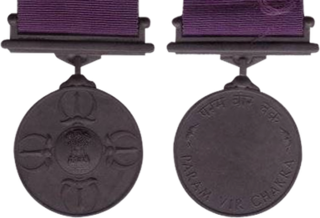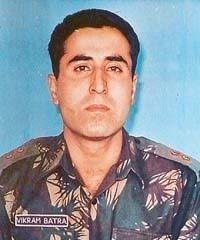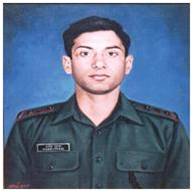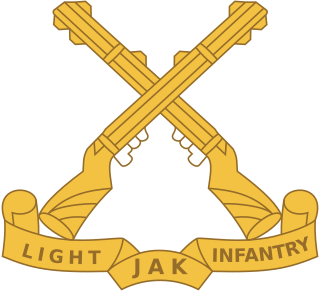Related Research Articles

The Param Vir Chakra (PVC) is India's highest military decoration, awarded for displaying distinguished acts of valour during wartime. Param Vir Chakra translates as the "Supreme Wheel of Bravery", and the award is granted for "most conspicuous bravery in the presence of the enemy". As of January 2018, the medal has been awarded 21 times, of which 14 were posthumous and 16 arose from actions in Indo-Pakistani conflicts. Of the 21 awardees, 20 have been from the Indian Army and one has been from the Indian Air Force. Major Somnath Sharma was the first recipient. A number of state governments of India as well as ministries of the central government provide allowances and rewards to recipients of the PVC.

The Kargil War, also known as the Kargil conflict,[note (I)] was fought between India and Pakistan from May to July 1999 in the Kargil district of Ladakh and elsewhere along the Line of Control (LoC). In India, the conflict is also referred to as Operation Vijay, which was the codename of the Indian military operation in the region. The Indian Air Force acted jointly with the Indian Army to flush out the Pakistan Army and paramilitary troops from vacated Indian positions along the LoC, in what was designated as Operation Safed Sagar.

Captain Vikram Batra, PVC was an Indian Army officer. He was posthumously awarded the Param Vir Chakra, the highest Indian military decoration, for his actions during the Kargil War; on 7 July 1999, Batra was killed while fighting Pakistani troops around Area Ledge, Point 4875, in the Kargil district of erstwhile Jammu and Kashmir.

Captain Manoj Kumar Pandey, PVC was an Indian military officer posthumous recipient of India's highest military decoration, the Param Vir Chakra, for his audacious courage and leadership during the Kargil War in 1999. An officer of the first battalion in the 11th Gorkha Rifles, he died in battle on the bunker hill edge of the Khalubar Hills in the village of Garkon Aryan Valley in Kargil.

Subedar Major Sanjay Kumar PVC is an Indian Junior Commissioned Officer, and recipient of the Param Vir Chakra, India's highest military award.

The Jammu and Kashmir Light Infantry is an infantry regiment of the Indian Army. The regimental center is in Srinagar's Airport Complex at Awantipora with a winter setup near Jammu. Its regimental insignia consists of a pair of crossed rifles. The regiment mostly consists of volunteers from the state of Jammu & Kashmir and ethnic groups from the state. The Jammu and Kashmir Light Infantry is considered to be one of the most decorated regiment of the Indian army having won 1 Param Veer Chakra and 3 Ashok Chakra. Naib Subedar Chuni Lal of the 8th battalion Jammu and Kashmir Light Infantry is one of the most decorated personnel of the Indian Army.

The Garhwal Rifles, formerly known as the Royal Garhwal Rifles, are an infantry regiment of the Indian Army. It was originally raised in 1887 as the 39th (Garhwal) Regiment of the Bengal Army. It then became part of the British Indian Army, and after the Independence of India, it was incorporated into the Indian Army.
Subedar Major and Honorary Captain Yogendra Singh Yadav PVC is a retired Indian military officer, who was awarded India's highest military award, the Param Vir Chakra, for his actions during the Kargil War. He is the youngest recipient of the Param Vir Chakra to date, having received it at the age of 19.

The Zoya Factor is a novel written by Anuja Chauhan, published by HarperCollins India in 2008. It is about a Rajput woman named Zoya Singh Solanki who meets the Indian Cricket Team through her job as an executive in an advertising agency and ends up becoming a lucky charm for the team for the 2011 Cricket World Cup. Chauhan started working on her debut novel in 2006, writing during her spare time. Her work on the Pepsi brand for 13 years at JWT Delhi, where she was Vice President and closely associated with cricket advertising, eventually led to cricket becoming the setting of her novel.

Anuja Chauhan is an Indian author, advertiser and screenwriter. As a writer, she is known for The Zoya Factor (2008), Battle For Bittora (2010), Those Pricey Thakur Girls (2013), The House That BJ Built (2015), Baaz (2017), Club You To Death (2021) and "The fast and the Dead."
Nishant Shokeen is an Indian film and television actor. He has done several commercial advertisements and television serials. Nishant is currently portraying the role of Lord Krishna in the second season of Zee TV serial Choti Bahu.

The Coca-Cola Cup was a tri-nation cricket tournament played in Sharjah in 1998. This was the first cricket tournament in Sharjah to be sponsored by Coca-Cola and was played under the aegis of the Cricketers Benefit Fund Series. The Round Robin format was followed with each team playing the other two teams twice each. All matches were day and night games and the tournament featured India, Australia and New Zealand cricket teams. This tournament was the first one in ten years which was held in Sharjah that Pakistan was not a part of. 24,000 spectators witnessed the final, a record turnout for a match at Sharjah Cricket Association Stadium, where all the matches were played.

The Kargil War Memorial, also known as Dras War Memorial, is a war memorial built by the Indian Army in the town of Dras, near Kargil city in Kargil district of Ladakh, India, commemorating the 1999 Kargil War between India and Pakistan. The memorial is located on the Srinagar-Leh National Highway 1D, about 5 km from the city centre across the Tiger Hill, Kargil.

Lieutenant General Yogesh Kumar Joshi, PVSM, UYSM, AVSM, VrC, SM, ADC is a retired General Officer of the Indian Army. He was the General Officer Commanding-in-Chief Northern Command, assuming office from Lt Gen Ranbir Singh on 1 February 2020. He last served as the Chief of staff of the Northern Command, assuming the office from Lt Gen SK Sharma. Previously, he was the commander of Leh based Fire & Fury Corps. As Army Commander he is credited with spearheading the Indian response to PLA's attempt to alter the status quo on Line of Actual Control (LAC) by use of force. He is the only war decorated Army Commander who has to his credit successes against both Indian adversaries China and Pakistan.

Shershaah (transl. Lion-king) is a 2021 Indian Hindi-language biographical war film based on the life of Vikram Batra, killed in action in the Kargil War, directed by Vishnuvardhan in his Hindi film debut and written by Sandeep Shrivastava. The film was produced by Dharma Productions and Kaash Entertainment, with Hiroo Yash Johar, Karan Johar, Apoorva Mehta, Shabbir Boxwala, Ajay Shah and Himanshu Gandhi serving as producers. Sidharth Malhotra stars in a dual role as Vikram Batra and his twin brother Vishal, with Kiara Advani as his girlfriend Dimple Cheema.
Major Ajay Singh Jasrotia, SM was an Indian military officer with the 13 Jammu and Kashmir Rifles who laid down his life during Kargil War to save the lives of his six comrades.

Captain Jintu Gogoi, VrC was an Indian Army officer of 17 Garhwal Rifles. He was posthumously awarded the Vir Chakra, India's third highest wartime military decoration, for his courage and bravery in combat during operations in the Kargil War in 1999.
Yeh Dil Maange More or Yeh Dil Maange More means "This Heart Desires More".
The Battle of point 5140 was fought on 20 June 1999 and was major military offensive carried out by the Jammu and Kashmir Rifles regiment as a part of the Operation Vijay. The Indian forces under Lt Col. Yogesh Kumar Joshi were able to capture the point.
References
- 1 2 "Anuja Chauhan puts in papers at JWT". Economic Times. August 2010.
- ↑ "Janet Jackson". Billboard . 21 November 2021. Archived from the original on 21 November 2021. Retrieved 20 May 2023.
- ↑ "Janet Jackson Album Discography and Track Listings | MTV". MTV . 28 December 2008. Archived from the original on 28 December 2008. Retrieved 20 May 2023.
- 1 2 "His soul sang Yeh Dil Maange More", Mid-Day, Delhi, 21 July 2009, retrieved 24 July 2009,
... and Pepsi listened. Captain Vikram Batra, all of 24 when he turned martyr, was recommended for Mahavir Chakra, but went on to win the Param Vir Chakra ...
- ↑ "Bravehearts say, yeh dil mange more", Mid-Day, Delhi, 26 March 2009, retrieved 24 July 2009,
... 2 NSG commandos seriously injured during Mumbai terror attack can't wait for action again ...
- ↑ "Kargil Update: Indian Army". Param Vir Chakra. Ministry of Defence, Government of India. Retrieved 26 July 2010.
- ↑ "Yeh dil maange more!". Mumbai Mirror. Archived from the original on 24 October 2007. Retrieved 18 December 2010.
- ↑ Butcher, Melissa (2003), Transnational television, cultural identity and change: When STAR came to India, SAGE, ISBN 0-7619-9766-0,
... much of the vocabulary highlights a perception of youth today as more ambitious and more individualistic ... Pepsi's 1998 commercial, Yeh Dil Maange More (This Heart Wants More), joins a list of advertisements that play on this theme ...
- ↑ John Amis, T. Bettina Cornwell (2005), Global sport sponsorship, Berg Publishers, ISBN 1-84520-081-0,
... Pepsi attempted to hijack Coca-Cola's official sponsorship of the 1996 Cricket World Cup ... the most disliked words among Indian youth were "official", "corruption" and "discipline" ... In an effort to attract youth, Pepsi developed the slogan "Yeh Dil Maange More" ...
- 1 2 "HC stays overseas release of film 'Dil Maange More'", Financial Express, 5 January 2005, retrieved 24 July 2009,
... Pepsi had coined the phrase 'yeh dil maange more' for its advertising campaign in December 1998 ... Sachin Tendulkar, Aamir Khan, Amitabh Bachchan ... earlier Coca-Cola, Omni Ltd, the producers of Tamil film Pepsi-Inda Ullam Kekkume More (Translation of Pepsi-yeh dil maange more), and North Delhi Power Corporation (users of phrase yeh dil maange more electricity) were restrained from using the said slogan/title ...